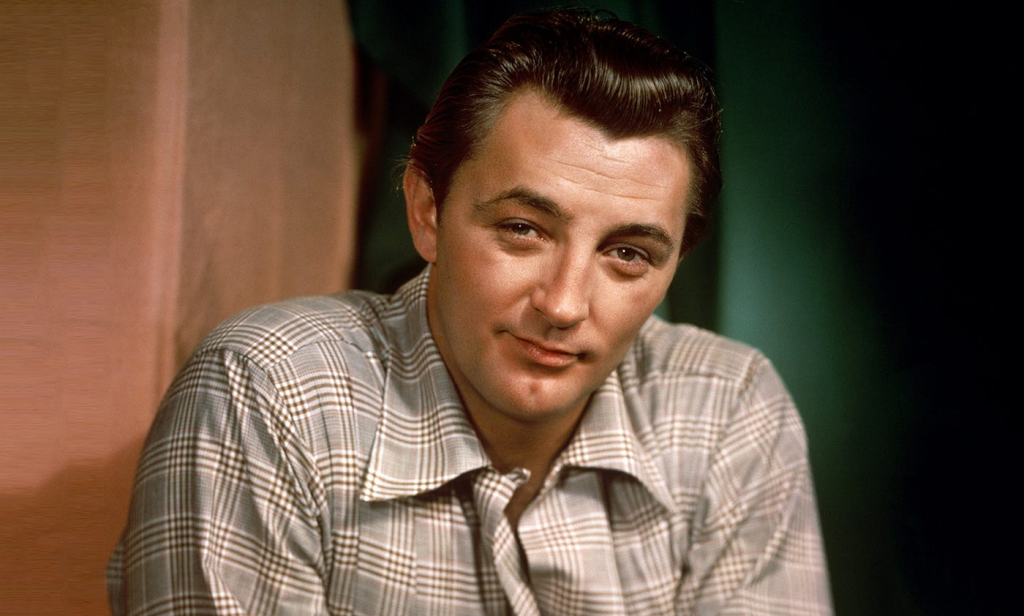He had that slow, smoky voice. The brooding eyes. The kind of presence that didn’t scream for attention—but demanded it anyway. Robert Mitchum was the very definition of cool before the word was even cool. From his humble beginnings to becoming a Hollywood icon, Mitchum didn’t just act in movies—he owned every frame.
Born on August 6, 1917, in Bridgeport, Connecticut, Mitchum came from tough roots. He wasn’t polished or privileged, and that’s exactly what made him magnetic. Long before he was lighting up the silver screen, Mitchum was hopping freight trains, working odd jobs, and brushing elbows with the law. That rough-around-the-edges life? It bled into every role he took—gritty, grounded, and unforgettable.

Rising Through the Ranks: From Drifter to Hollywood Powerhouse
Mitchum’s entry into acting wasn’t part of a grand plan. It was more like fate having a good laugh. He started small—background roles, bit parts—but he had something that couldn’t be taught: presence. Audiences didn’t just watch him; they felt him.
His breakout came in Thirty Seconds Over Tokyo (1944), but it was Out of the Past (1947) that solidified him as the king of film noir. Picture it: shadows, smoke, a femme fatale, and Mitchum with a cigarette dangling from his lip. No one did “tough but tortured” like he did. He brought a quiet intensity to the screen that made even the most hardened characters seem human.
Video: Robert Mitchum: The Reluctant Star | The Hollywood Collection
The Face of Film Noir: Laid-Back Style, Hard-Edged Roles
If film noir had a face, it would be Robert Mitchum’s. He was the go-to guy for morally complex antiheroes—men who played by their own rules and paid the price for it. His performances in The Big Steal (1949), His Kind of Woman (1951), and Angel Face (1953) were textbook noir: cynical, layered, and darkly magnetic.
What made him stand out? He wasn’t trying to be a movie star. He just was. He’d deliver a line like he was half-asleep—and somehow it still hit harder than anyone else in the room. That laid-back style, that sleepy gaze—it wasn’t laziness. It was effortless power.
Stepping Beyond Noir: Chilling Villains and Surprising Range

Sure, Mitchum had noir nailed down, but he was far from a one-trick pony. He could be terrifying. Just ask anyone who’s seen The Night of the Hunter (1955), where he played a sinister preacher with “LOVE” and “HATE” tattooed on his knuckles. It’s one of the most haunting performances in movie history.
Then came Cape Fear (1962), where he upped the nightmare factor as a vengeful ex-con. Mitchum didn’t just play villains—he became them. But just when you thought he was all grit and menace, he flipped the script in roles like Heaven Knows, Mr. Allison (1957) and Ryan’s Daughter (1970), showing a surprising tenderness and depth.
Living on His Terms: Mitchum’s Off-Screen Rebellion

What you saw on screen? That was pretty close to the real Robert Mitchum. He didn’t play the Hollywood game. He had no patience for pretense. In 1948, he got busted for marijuana possession—a scandal that would’ve ended most careers. Mitchum? He shrugged it off and came back even stronger.
That devil-may-care attitude wasn’t an act. He hated interviews, called acting “just a job,” and didn’t care much for awards. And yet, he worked nonstop for over five decades. He knew his craft, and he respected it—he just didn’t see the point in talking it to death.
The Transition to TV: Still Cool in Every Frame

As time marched on and roles changed, Mitchum adapted. He wasn’t stuck in the past. In the later part of his career, he took on television roles, bringing his signature intensity to series like The Winds of War (1983) and War and Remembrance (1988).
Even in his twilight years, the charisma never faded. His voice deepened, his features aged, but the Mitchum mystique stayed rock solid. He didn’t try to reinvent himself—he just let the world evolve around him.
A Lasting Legacy: More Than Just a Hollywood Star
Video: Robert Mitchum and Janet Leigh in Holiday Affair
Robert Mitchum passed away in 1997, but his influence is still everywhere. Watch any modern actor playing a morally gray character, and you’ll see a bit of Mitchum in there. He was the blueprint for the reluctant hero, the charming villain, the guy you shouldn’t trust but can’t help rooting for.
He didn’t chase fame. He didn’t bend for the system. And somehow, that’s exactly what made him legendary. Mitchum once said, “Movies bore me, especially my own.” But the truth? He made it all look like poetry in motion.
Conclusion: Robert Mitchum—A Legend Carved in Smoke and Shadow

So, can you guess who he is? The gravel-voiced heartthrob who never needed a spotlight to shine. The tough guy with the soul of a poet. Robert Mitchum didn’t just leave a mark on cinema—he branded it with cool, grit, and timeless charisma.
From classic noirs to bone-chilling thrillers, from rebellion to redemption, Mitchum’s story is one of resilience, talent, and unshakable presence. His legacy reminds us that you don’t need to shout to be heard. Sometimes, a quiet stare, a few well-placed words, and an unflinching sense of self are all it takes to become unforgettable.


